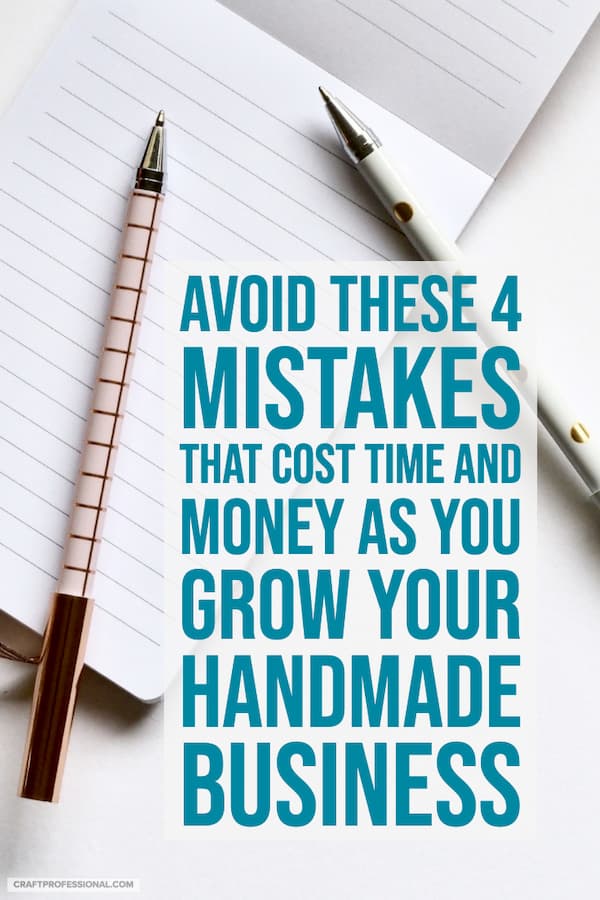4 Mistakes Handmade Business Owners Make
As you build your handmade business, you make a whole lot of decisions that shape the core nature of your business. And many people make those choices without really realizing they are making decisions.
They just dive in.
When you dive in, you make mistakes. You miss promising opportunities. And you can waste time and money pursuing something that isn't the right fit.
Four common mistakes I've made myself and seen other handmade business owners make come down to lack of planning. It's really a shame to get caught by these mistakes because a little research and brainstorming can help you avoid or minimize them.
Bouncing From One Idea to the Next

Oh, yeah. I've made this mistake. I'm completely guilty. And, I know some of you are guilty, too, because I've seen it often.
You start out with one handmade business idea, and you're moving along, making progress, and then BOOM! another brilliant idea pops into your head.
So you start to tinker with your new idea without much of a plan to determine how your new idea might complement your current business, or how you'll have time to work on both ideas, or whether the new idea even has real potential.
Oh, if I could have back the time I've wasted on business distractions - projects that seemed like a good idea in the moment but, ultimately, didn't complement my core business and took me away from working on my most promising opportunities.
Bouncing from one idea to the next is a result of poor planning. If you spend some time on the front end brainstorming all of your craft business ideas, researching the best ones, and deciding which one idea was the best fit for you, you won't be so easily tempted by every new idea that pops into your head.
Good research gives you confidence that the business idea you're pursuing is the best option for you. It gives you a clear vision of the future you want to create. And that confidence and vision makes makes you less susceptible to distractions.
When you know where you want to go, and you know you're on a path to that destination, you're better able to maintain your focus.
Falling in Love With Ideas
I've made this mistake, too. If you're creative, you probably have a million ideas before lunch. And you fall in love with some of those ideas. They are just so lovely.
The problem with falling in love with a business idea is you become blind to evidence that the idea doesn't have a lot of potential or isn't a great fit for you.
When you love your ideas, you fail to test your ideas. Ideas you love aren't made to stand up against a critical assessment.
You never look for problems that could be deal breakers. Or maybe you do find problems, but you ignore them, assuming they will go away or you'll somehow solve them because your idea is just so wonderful it has to work out.
New ideas can be thrilling. I know. I've fallen in love with an idea (or two, or three). But if you're going to commit resources - time and money - into developing a handmade business idea, first you need to require that idea to pass some tests.
Some simple research will help you determine if an idea is feasible. Thinking through a business idea will help you determine if you can make it profitable, make it fit with your business goals, and make it work with your existing skills and resources.
Once you've done that research, and you're convinced that an idea does have a lot of potential, at that point, by all means, fall deeply in love with your idea. In fact, if an idea stands up to your scrutiny, you'll have a deeper understanding of your idea and its full potential. If an idea passes your tests, you'll have even more reasons to love your idea.
Not Thinking About How Your Handmade Business Fits With Your Priorities
A business idea can look fantastic from the outside looking in. But sometimes there are surprises lurking just below the surface. Those surprises can be easy to miss if you don't do any planning or research, but they can be very simple to spot and deal with if you just put in a little extra work at the front end.
If you're selling crafts as a way to build a business around something you love, you must make sure that business fits with your other priorities.
Take some time to do a little soul searching.
Ask yourself:
- What are the most important elements of my life?
- Which would I like to change?
- Which would I like to stay exactly the same?
When you have a good grasp of your biggest priorities, take some time to think about how your handmade business idea will impact those priorities.
Will your idea lead you to creating more of what you want in your life?
How can you push your idea to make it better enhance your priorities?
Will your idea have a negative impact on your priorities? Can you change that in some way? Is it a deal-breaker or something you're willing to accept because there will be other benefits?
Failing to Make the Best Use of Your Abilities, Work Preferences, and Resources
We all have strengths and weaknesses we bring to our business. We can't completely avoid challenges, but it certainly would be wise to ensure the core tasks of your handmade business are a good fit for your strengths.
Have you thought through all of the core strengths required to make your business a success?
You don't have to be an expert in everything. There's always room for growth, and some tasks can be outsourced to people who are better suited to the job (My accountant is welcome to the task of working out my taxes). However, if a task is central to your business, it should be something that's a good fit for you.
Alternatively, have you thought through all of the strengths you bring to your business? You may have key strengths that hold great potential to make you a customer favorite and push your business beyond the competition.
Those key strengths aren't always the most obvious strengths.
You may be a talented jewelry designer, but it's your special gift for getting to know the heart of people that allows you to create truly extraordinary custom personalized jewelry.
Perhaps you're a skilled chef, but it's your true passion for sourcing the very best ingredients in the world that makes your handmade chocolates tiny works of art.
If you haven't inventoried your strengths, you may be building a business that requires you to pull heavily from an area of weakness. Alternatively, if you haven't inventoried your strengths, you may miss out on an opportunity to connect your biggest strengths to create a truly spectacular business.
Make Smart, Well Informed Business Decisions
The choices you make as you develop your handmade business can have a huge impact on the success of your business and on your happiness with your business.
Are you building a business that plays to your strengths, or will major parts of your business depend on skills that aren't your strong point?
Are you building a business that's in line with your values and expectations, or will you discover along the way that the business you've built is not really the business you wanted?
Are you building a business that is in line with your time and money resources, or will you, at some point, be surprised to find out that growing your business requires more time or money than you're able to commit?
Developing a good plan doesn't have to take a lot of time, but investing some time to researching and brainstorming the best way to develop your business pays off. Good preparation can save you from mistakes and save you time and money.
It's well worth doing some planning. Most craft professionals won't need a formal business plan, but you do need some vision for where you are going and how you will get there.


New! Comments
Have your say about what you just read! Leave me a comment in the box below.